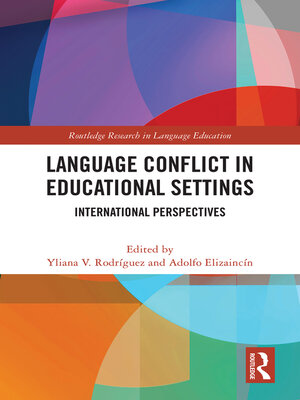Language Conflict in Educational Settings
ebook ∣ International Perspectives · Routledge Research in Language Education
By Yliana V. Rodríguez

Sign up to save your library
With an OverDrive account, you can save your favorite libraries for at-a-glance information about availability. Find out more about OverDrive accounts.
Find this title in Libby, the library reading app by OverDrive.



Search for a digital library with this title
Title found at these libraries:
| Library Name | Distance |
|---|---|
| Loading... |
Language Conflict in Educational Settings: International Perspectives delves into the intriguing intersection of contact linguistics and education, a topic that has been relatively unexplored until now.
With contributions from scholars across the globe, the book ventures into the realms of conflict linguistics in educational scenarios. Language contact, often fraught with internal and external conflicts, impacts education significantly. Drawing on scholarship representative of different locations, backgrounds, and disciplinary angles, the authors present studies of pairs and triads of different language families from across the Americas, Africa, Asia, and Europe, ultimately demonstrating how language contact leads to conflict, and how the latter eventually affects education processes and outcomes. Presenting a diverse set of theoretical perspectives and methodologies, it asks to what extent these impacts are detrimental to educational outcomes, and more specifically, how language conflict can impact education in the form of policy, teaching, and learning. As such, it provides essential insights for educators, policymakers, and professionals in the fields of education, linguistics, and cultural studies, offering valuable case studies in the under-researched field of language conflict. It ultimately contributes to the enhancement of education in language contact contexts and fosters a deeper understanding of this critical intersection.
This book is an invaluable resource for researchers, scholars, and teacher-educators, offering insights to help understand such an intricate phenomenon, as well as those working across language education, linguistics, and the sociology of language more broadly.







